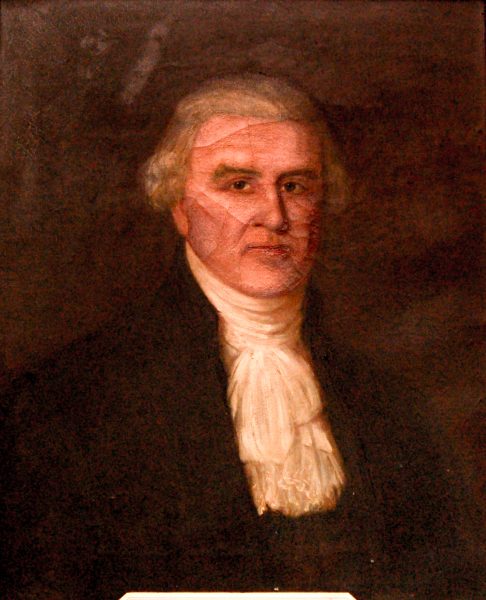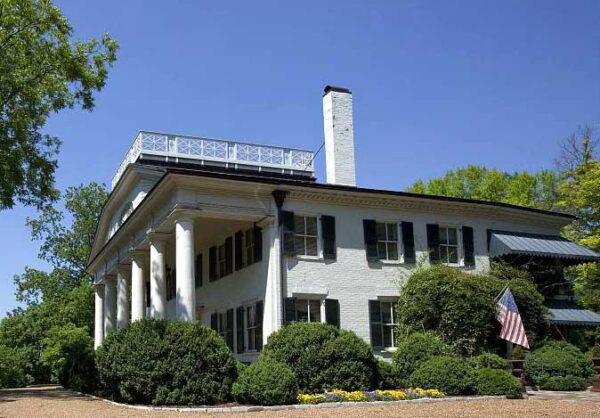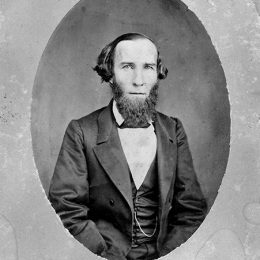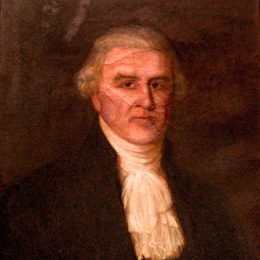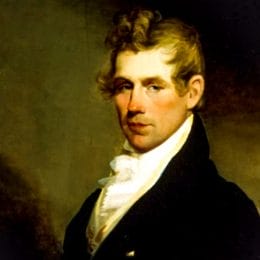LeRoy Pope
Cotton planter and attorney LeRoy Pope (1764-1844 or 1845) was a founder of the city of Huntsville, having purchased much of the land on which the city now sits in 1809. He was also the first chief justice of the first court held in Madison County. His former home, Poplar Grove, is a noted structure in the Twickenham Historic District.
LeRoy Pope was born on January 30, 1765, in Northumberland County, Virginia, to LeRoy Pope Sr. and Elizabeth Mitchell Pope. He was one of four children. LeRoy was a member of a large family of Popes who had established plantations in the Tidewater region of Virginia. In contemporary obituaries, he is said to have served in the American Revolution and participated in the Siege of Yorktown in September and October of 1781 as a courier for George Washington.
In 1790, Pope joined a large group of planters and others who relocated to the now-vanished town of Petersburg, Georgia, approximately 75 miles north of present-day Augusta. This group followed in the footsteps of a similar group that relocated to the area in 1784. Largely composed of Revolutionary War veterans and their families, these emigrants settled on the fertile lands bordering the Broad River that were offered by the state government to settlers. Among the notable settlers in the Broad River region were future Alabama legislator and judge Charles Tait and future Alabama governor Thomas Bibb.
At some point, Pope married Judith Sale, who was born in Amherst, Virginia, and emigrated to Georgia. The couple would have five children. Daughter Matilda married John Williams Walker, another early settler and a member of the so-called Broad River Group of Georgia land speculators. Son John Pope reportedly became a wealthy cotton planter in his own right, in Memphis, Tennessee.
As Native Americans were forced from their lands in what is now northern Alabama, white settlers from Georgia, Tennessee, and the Carolinas began moving into the area. In 1809, Pope, John W. Walker, and Thomas Bibb headed the Broad River investors who bought large tracts of land in Madison County, which was in the Mississippi Territory at the time. Based on surveys by Gen. John Coffee, who had been appointed federal surveyor general, Pope and his fellow investors laid out a new town that he named Twickenham after the estate of British poet and possible relative Alexander Pope. Pope was named a justice of the peace in 1809. In early 1810, Coffee, Pope, and other investors successfully lobbied the state legislature to have Twickenham named the county seat, and sales of the lots began in July. In 1811, however, the Alabama Legislature changed the name of the town to Huntsville to honor its first settler, John Hunt, who arrived in what was known as Big Spring in 1804. Many local residents were small farmers who had emigrated from Tennessee, including future Alabama governor Gabriel Moore, and they resented the control that the Broad River wealthy planters exerted over the town and pushed for the name change. Also, there was little love for British names as diplomatic relations between the United States and Great Britain were souring in the lead-up to the War of 1812.
He was appointed first chief justice of the Madison County courts in December 1811. Around 1814, Pope oversaw construction of Poplar Grove, his large estate in town. By this time, he was a wealthy businessman and planter who owned more than 120 enslaved people and hundreds of acres in the area. He helped to establish the Planters and Merchants Bank and became its president in 1816. The following year, on June 1, Pope and future governor Clement Comer Clay hosted a banquet for visiting U.S. president James Monroe. He arrived in Huntsville as the Territorial Legislature gathered to prepare for Alabama's admission to the United States as its twenty-second state. In 1843, Pope helped found the town's Episcopal church, the Church of the Nativity. Additionally, he served as a state-appointed commissioner for the bank he founded as well as the Indian Creek Navigation Company, which oversaw development of the Fearn Canal from Hunt's Spring to Triana. Throughout his life, he served in many other formal and informal roles in the development of Huntsville and is often known as the "Father of Huntsville." Sources differ on his death date. His tombstone says that he died on June 17, 1845, but contemporary obituaries state that he died on June 14, 1844. He was buried in Huntsville's Maple Hill Cemetery.
Further Reading
- Betts, Edward Chambers. Historical Huntsville. Birmingham, Ala.: Southern University Press, 1966.
- Pruitt, Ranee G., ed. Eden of the South: A Chronology of Huntsville, Alabama 1805-2005. Huntsville: Huntsville-Madison County Public Library, 2005.
